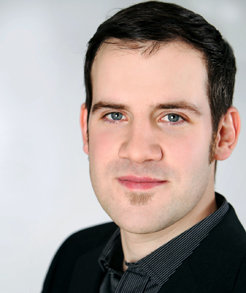Astrophysicist in Hannover among the top 40 under 40 years of age
The magazine Capital votes the AEI researcher Holger Pletsch among the 40 most promising young German scientists of 2014
Holger Pletsch heads an Independent Research Group at the Max Planck Institute for Gravitational Physics (Albert Einstein Institute; AEI) in Hannover. His group works on the development of innovative, efficient methods for the computationally-intensive search for the extraordinary celestial bodies known as neutron stars. For astronomers, these play a key role in understanding a number of central questions in fundamental and astrophysics. Owing to their innovative methods, Pletsch’s group has already discovered over a dozen special neutron stars, which had previously been overlooked by other scientists.
Promising pioneer
The editorial staff of the magazine Capital votes Holger Pletsch among 40 researchers who show strong potential to occupy top positions in German science or who already hold such a position and who are not older than 40. At 31 years of age, Pletsch is one of the three youngest pioneers to have been honoured.
Internationally recognized researcher

After studying physics at the TU Kaiserslautern and the University of Wisconsin–Milwaukee, Holger Pletsch did his doctoral work at the AEI Hannover and was subsequently awarded his doctorate in 2009 from Leibniz Universität Hannover with summa cum laude.
His dissertation was awarded two science prizes: As the youngest Max Planck Society doctoral student in 2009 with an outstanding doctoral thesis, Holger Pletsch received the Dieter Rampacher Prize 2009. In the same year, the Gravitational Wave International Committee (GWIC) awarded him the international GWIC-Thesis Prize for the best dissertation in the field of gravitational wave astronomy.
In 2013 he received the renowned Heinz Maier-Leibnitz Prize of the DFG and the German Federal Ministry of Education and Research (BMBF). Since April 2013 he has headed an Independent Research Group at the AEI Hannover which, among other things, is being funded as of this year by the German Research Foundation within the framework of its Emmy Noether Programme to the tune of around one million euros over a five year period.
Summit meeting
In line with the topic “The Generation of Digital Decision-makers”, Holger Pletsch will attend the “Capital Junge Elite Gipfel 2014” (Capital Young Elite Summit 2014) which will take place on 3 July 2014 at the Humboldt Carré and Soho House in Berlin.
Background information
Neutron stars as tools of fundamental physics
Neutron stars enable astronomers to investigate fundamental physical phenomena under extreme conditions. Owing to their enormous gravity, these objects are suitable as the ideal test environments for Einstein’s general theory of relativity. Their high density allows researchers to explore matter under conditions that are not realizable on Earth. As remnants of exploded stars, they illuminate their partly unusual “life journey” and deepen our understanding of stellar evolution. Moreover, neutron stars are generally considered to be promising sources of gravitational waves whose direct measurement will herald a new era in astronomy.












